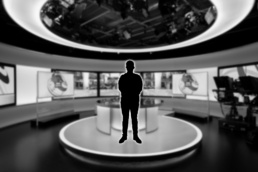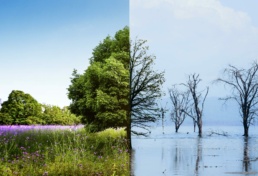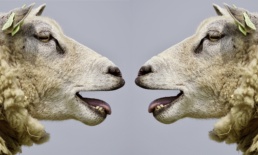Is Comms “creative?” And if it is, how do we make comms people MORE creative?
We tackled this topic in our latest episode of “Comms In Question: Why you’re a ‘creative’ and why that’s more important than ever.” Jordan Ray and a panel of experts explored topics like how to build a creative process, tips and tricks for kick-starting creativity and predictions for the future of creativity.
You can watch the recording here:
Is Communications creative?
Hard YES.
As Creative Director Matthew Aubie said, everyone is the business of communications – from the Fortune 500 CEO to the neighbourhood crossing guard. But what sets professionals apart from everyone else is creativity.
“The way that I define creativity in this sense is the ability to ideate,” said Aubie. “So, when we’re thinking about communication, professional communications, being able to be creative means that you’re going to be able to circle the situation – whether it’s a visual identity or a brand strategy – and look at it in ways that not everybody might look at it. In doing so, you’ll find many different approaches, land on something a little more special or meaningful than what might come from everyday thinking.”
Communications Director and singer Tiffany Gooch agreed. “We move really quickly in Communications,” said Gooch. “It’s fast-paced, and you might need something written very quickly. So, I think always having a core of creativity asks you, sometimes, to slow down and create something that may not have come out of the templates that would have been in your package.”
More than a tool; it’s a necessity
Our panelists agreed we need to think about creativity as a skill. We can’t accept that creativity is just a ‘nice to have’ tool reserved for special occasions. As Gooch said, we need to see creativity as “a muscle you’re flexing over the entire year all of the time and in different ways.”
Gooch described the moment she realized that she no longer wanted to think of her life as a singer and her life as a communications professional as separate.
“I literally thought they were two different personas,” said Gooch. “There was this person who was songwriting and creative writing. [But] on the other side, I felt like I needed to put on the suit jacket for the other space. Then I realized that first, they were all the same person, and second, that my ability to bring all of those things to my work really was my differentiator.”
“I literally thought they were two different personas,” said Gooch. “There was this person who was songwriting and creative writing. [But] on the other side, I felt like I needed to put on the suit jacket for the other space. Then I realized that first, they were all the same person, and second, that my ability to bring all of those things to my work really was my differentiator.”
Panelist Robert Rotenberg, a criminal lawyer and award-winning author, also spoke about his experience straddling dual personas.
“I get asked every day,” said Rotenberg, “‘How can you write books and also be a lawyer?’ And my standard answer is: being a writer has made me a better lawyer. And [being] a criminal lawyer – where I see people’s lives exposed – has made me a better writer.”
Referencing his late brother David, a well-known creative in the film and television industry, Rotenberg described the inextricable relationship to creativity as “a compulsion.”
“It’s like an itch – you just have to get it out,” he said. “As my brother said once, ‘If you’re in the shower and you’re not thinking about a scene in your book, a problem, or a dialogue, then you’re not writing.’”
Matt Aubie doesn’t compartmentalize creativity either.
“The creativity is probably happening before [sitting down to create],” Aubie said. “It’s the constant background considerations and observations that you’re making. So, I never sit down and say, ‘Alright, it’s time to be creative.’ I’ll sit down and say, ‘It’s time to solve this problem.’ So, I hope all of the preparation I’ve done before I’ve sat down has prepped me to do that work.”
But what can we do when we’re stuck?
Still, there are always times when creativity is just not coming. The clock is ticking. The boss needs a draft. So, what can we do when the creative juices just aren’t flowing?
Here’s what our panelists said:
Tip #1: Time in Nature
Tiffany recommended getting outside if you’re stuck on an idea. “I find nature to be the best creative force,” she says.
So, whether gardening or taking a walk, Gooch said that immersing yourself in nature can be a great source of inspiration.
Tip #2: Ask AI or Take a Break
Matt offered two creativity hacks. The first is to go to AI for ideas. Because sometimes having something on the page, good or bad, can kickstart the imagination. Otherwise, he recommends putting the pen down.
“Just stop and come back to it,” he said, stressing that you might be blocked because you’ve been going at the idea for too long. He urges us to have the confidence to step away and come back with fresh eyes at a later time.
Tip #3: Lay on the Floor with a Towel
A unique hack, but one that Robert swears by.
Robert says he can often get blocked when writing his novels. His specialty as an author is complex stories with many twists and turns across multiple plot points, so it’s easy to get stuck. In times like those, he recommended laying on the floor, putting a towel over your head, and just thinking through the problem. Importantly, Robert urged that this time should be spent without the distraction of music or radio. “Just you and your little brain,” he joked.
Check out our full conversation to get inspired and fuel your own creativity.
Thank you again to our incredible panelists, Matthew Aubie, Tiffany Gooch, and Robert Rotenberg.
Want to push your team’s creativity? Get your group inspired with one of our training sessions like Storytelling, AI for Communicators, or customize your own. Contact us today.
Shannon Currie
Senior Consultant and Writer at Curious Public.
Related Posts
June 11, 2022
Why the Three Most Frightening Words in English Are “Has Legal Reviewed?”
0 Comments6 Minutes


